Jobs Situation Report 16th Edition
Nearly 60,000 Jobseekers placed into opportunities under the SGUnited Jobs and Skills Package.
Growth sectors continue to account for majority of available openings. Nearly 5,200 available openings in the Financial Services sector.
- This week’s Jobs Situation Report (JSR) - the last for 2020 - provides a round-up of the efforts to curate jobs and skills opportunities under the SGUnited Jobs and Skills Package. We will also provide an overview of the sectors with the highest number of available openings, with a focus on the Financial Services sector.
- In 2021, MOM will continue to provide periodic updates on different sectors through the JSRs. The reports will also focus on other aspects such as the progress of the Jobs Growth Incentive in supporting the creation of good and long-term jobs for locals.
Placements under SGUnited Jobs and Skills Package
- By August, the National Jobs Council had exceeded the initial target to curate 100,000 jobs and skills opportunities under the SGUnited Jobs and Skills Package to support local jobseekers of which more than 40,000 were jobs, with the remaining comprising company-hosted traineeships and attachments as well as training opportunities. From April to October, nearly 60,000 jobseekers have been placed into these opportunities, due to the strong coordination efforts among tripartite partners (Chart 1).
- More than 80% (47,400) were placed into jobs, exceeding the original target of more than 40,000 jobs. Of these job placements, there was a good mix of PMET and non-PMET roles, with 6 in 10 in long-term positions.
- Around 20% (11,000) of the placements were into company-hosted traineeships and attachments, and training opportunities which will help the jobseekers gain relevant work experience for future employment.
- Mature jobseekers (aged 40 & above) were well represented among those placed , comprising around 50% of job placements and about 35% of company-hosted traineeships and attachments and training opportunities.
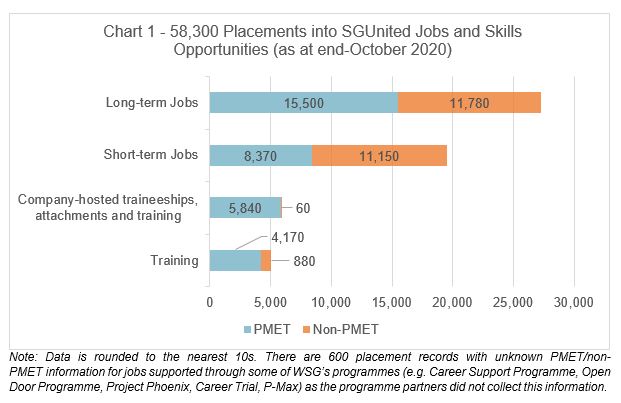
Sectors with most placements
- As at end-October, the top five sectors in which most jobseekers and workers were placed into opportunities are growth sectors: i) Information & Communications, ii) Healthcare, iii) Manufacturing, iv) Professional Services, and v) Financial Services (Chart 2).
- The Healthcare sector had the highest number of job placements. Majority have taken on long-term jobs, in both healthcare professional and executive roles as well as healthcare support and administrative support roles.
- When all types of placement opportunities are included, the Information & Communications sector placed the highest number of jobseekers. About 70% are in company-hosted traineeships and attachments, and training opportunities. These will help jobseekers gain a foothold in the sector and build up their skill sets and professional networks to increase their chances of securing a full-time role.
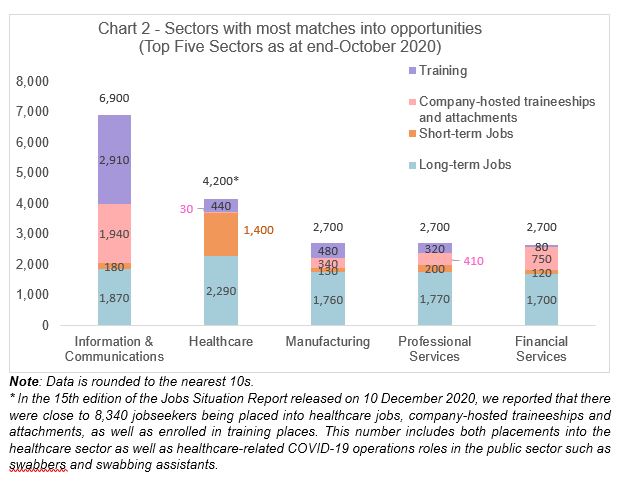
Available Openings under SGUnited Jobs and Skills Package
- In addition to past placements, there are now more than 123,000 available openings for jobseekers (Chart 3). It is encouraging that close to three in four (91,300) of the available openings are in jobs and mostly, long-term jobs.
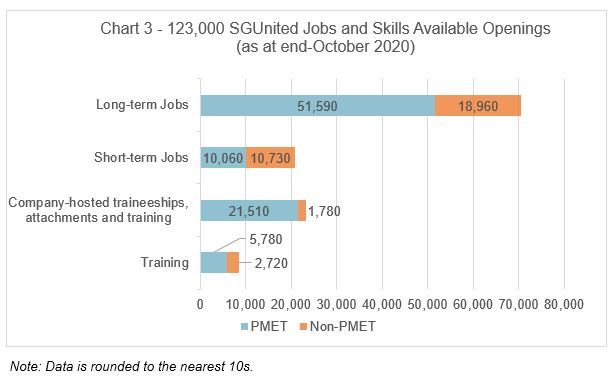
Sectors with the highest number of available openings
- Hiring demand in growth sectors has picked up, and account for majority of available openings. With the gradual re-opening of our economy, Food Services and Retail also accounted for a large number of available openings. Chart 4 shows the top five sectors with available openings.
- The Information & Communications sector has both the highest number of available job openings as well as available company-hosted opportunities and training places. These include tech-specialist roles such as software, web and application developments as well as tech-lite roles such as customer successful manager, and digital marketing specialist which may be suitable for applicants without infocomm technology background or experience.
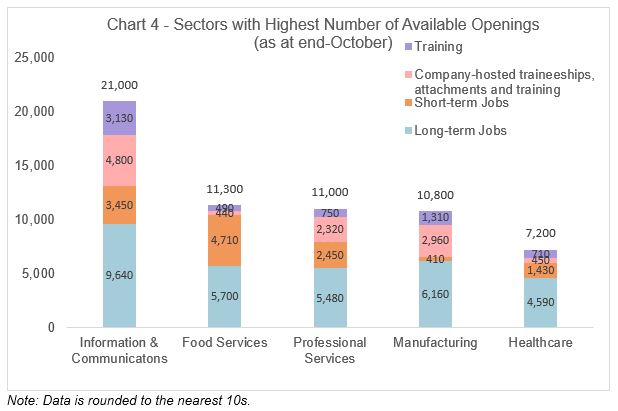
Efforts to match more jobseekers into available openings
- While placement numbers have been encouraging so far, our focus remains to match more jobseekers into the available openings.
- Job roles in sectors such as Information & Communications and Healthcare tend to have a higher level of skills requirement, the Government has put in place multi-pronged approaches to enable locals to access opportunities in these sectors, as outlined in the 14th and 15th editions of the JSR respectively.
- In the Information & Communications sector, there are placement programmes such as Company-Led Training and TechSkills Accelerator (TeSA) Mid-Career Advance to help locals secure jobs as well as company-hosted traineeship and attachment opportunities in areas such as user experience/interface design (UX/UI) development, digital marketing, and network engineering.
- In the Healthcare sector, there are Professional Conversion Programmes for Nurses and Allied Health Professionals that mid-career locals can tap on gain professional qualifications from Institutes of Higher Learning to take on roles such as nurses, physiotherapists, occupational therapists, and diagnostic radiographers. There are also available company-hosted traineeship and attachment opportunities in roles such as patient service associates and pharmacy assistants.
- On the other hand, for traditionally labour-intensive sectors like Food Services and Retail, as outlined in the 6th and 9th edition of the JSR respectively, the challenge is for companies to transform and for at-risk workers to reskill so that the sector can thrive and meet business demand when the economy recovers.
- Efforts include the Job Redesign Reskilling Programme introduced by WSG in Feb 2020 to help companies enhance and redesign jobs (e.g. cross-training workers to perform both front-of-house and back-of-house roles).
- There are also company-hosted traineeship and attachment opportunities in roles such as flavour technologist, and business development trainee.
- More information on the specific measures to match jobseekers outlined in the previous editions of the JSRs can be found on the MOM website.
- Together with Unions and employers, the Government will press on with our efforts to improve matches between jobseekers and available openings to help jobseekers emerge stronger for the eventual economic recovery.
Overview of and Impact of COVID-19 on Financial Services Sector
- Supporting Singapore’s position as a leading global financial centre, the Financial Services Sector is a key contributor to Singapore’s economy, accounting for approximately 13% of Singapore’s GDP and employing more than 170,000 workers.
- While COVID-19 has caused significant disruption to the economy and labour market, Singapore’s Financial Services Sector remained resilient, reflecting its strength as a global and regional financial hub. The substantial investments that the sector has made in digital transformation over the last few years, even before COVID-19, enabled financial institutions (FIs) to meet the evolving needs of customers. FIs have also managed to minimise disruption to business efficiency and processes and to continue serving their customers through the Circuit Breaker period by adopting remote work arrangements.
- The Financial Services Sector has performed creditably this year, against the challenging COVID-19 crisis. In the first three quarters of this year, growth in the finance and insurance sector averaged 4.7% .
- 1,900 jobs were created in the first half of 2020; all of these jobs went to locals.
SGUnited Jobs and Skills Available Openings in the Financial Services Sector
- As at end-Nov, there are nearly 5,200 available openings in Financial Services (breakdown in chart 5).
a.More than 96% are in PMET roles such as compliance, risk management, financial analysis, software development relationship management and data analysis.
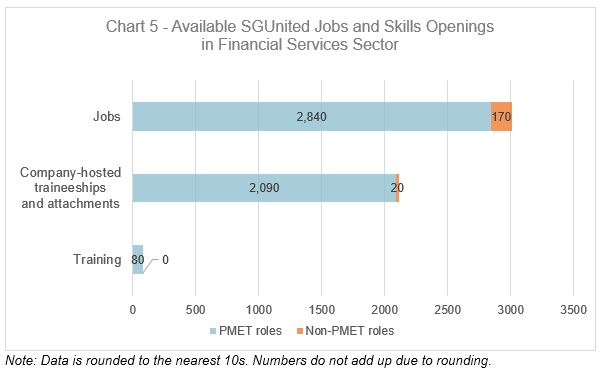
- Salary ranges for major roles with highest number of job vacancies in Financial Services are in Chart 6 below.
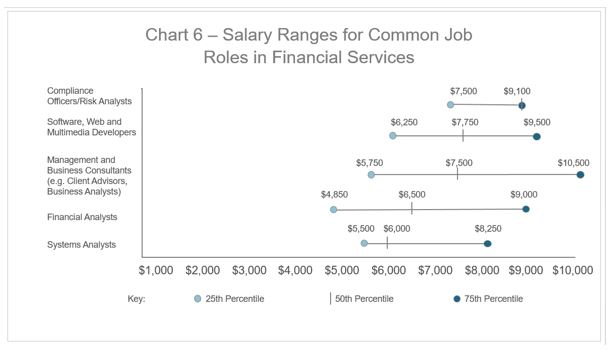
Approach to capture growth in Financial Services Sector
- Even though the economic recovery has been uneven and remains uncertain, FIs in Singapore continue to expect to hire. In addition to the 5,200 total available openings under the SGUnited Jobs and Skills Package as at end-November 2020, MAS’ pilot Employment Outlook Survey with over 30 FIs in June 2020 also showed that FIs are planning to create about 1,800 net jobs from July 2020 to June 2021.
- About half of the hiring demand is from technology functions, including application developers, application architects, and business analysts. There is also healthy growth in hiring in business segments such as private banking and wealth management, corporate banking, consumer banking, and insurance.
- MAS is actively working with industry to capture new opportunities to grow the sector and provide good jobs for Singaporeans, in areas such as green finance, pandemic risk financing and restructuring & insolvency.
- MAS and IBF, which has been appointed the Jobs Development Partner for the Financial Services Sector by the National Jobs Council, are committed to ensuring that locals are able to access all the opportunities in Financial Services. Leveraging data collected from the Employment Outlook Survey, which will be conducted every six months, MAS and IBF will proactively engage FIs on job and training opportunities for Singaporeans.
- Strengthening the Singaporean core;
- Grooming Singaporeans for leadership;
- Supporting jobseekers to enter into job growth areas;
- Ramping up Professional Conversion Programmes to support mid-career transitions.
- Providing access to company-hosted traineeships and attachments under the SGUnited Jobs and Skills Package. Currently FIs have filled about 1,000 of such opportunities, and there remain 2,100 available openings.
- Supporting existing workers to reskill and be redeployed to job growth areas;
- Rolling out Redeployment Professional Conversion to reskill 3,400 existing staff.
- Preparing tertiary students to embark on a career in Financial Services.
- The number of Institutes of Higher Learning graduates enter Financial Services in 2020 is around 2,500.
A. Strengthening the Singaporean core
- Building a strong pipeline of local talent is key to supporting and sustaining FIs’ long-term development in Singapore. Many FIs set up their bases here to tap on our high-quality talent pool and grow their businesses in the region.
- MAS and IBF have been partnering FIs to create jobs and progression opportunities for Singaporeans in the sector. This creates a win-win proposition for both the industry as they have access to a deep talent pool to grow their businesses, while creating good jobs for Singaporeans.
B. Grooming Singaporeans for leadership at different levels
- Another area of focus is leadership development, where MAS supports FIs in grooming Singaporeans with high potential for leadership roles. This includes supporting FIs to hire and groom Singaporeans through structured talent development programmes through the Finance Associate Management Scheme (FAMS), and by encouraging FIs to send promising Singaporean professionals for regional postings via the International Postings (iPOST).
- Singaporeans make up 44% of senior management roles in the sector in 2019. The absolute number of Singaporeans holding senior level positions has been growing at a healthy pace as the base has expanded. 2,600 Singaporeans now hold such positions, 900 more than five years ago, which represents an increase of 50%.
C. Supporting jobseekers to enter into job growth areas
Ramping up Conversion Programmes to support mid-career transitions
- MAS and IBF will also prioritise new training and attachment programmes for mid-career professionals making career transitions into growth areas in the Financial Services Sector. Such programmes will be modelled on the Technology in Finance Immersion Programme (TFIP), which was launched in April 2019 by MAS, IBF, Workforce Singapore (WSG), and the Infocomm and Media Authority (IMDA) to help professionals start a career in areas such as cloud computing, cybersecurity, data analytics, full stack development and artificial intelligence, through structured training and attachments at participating FIs.
- Over 260 individuals have benefitted from the TFIP over the two runs.
- One example is 33-year-old Muhammad Helmy Bin Razali. He had worked 10 years on security sector, but he decided to switch into cybersecurity through TFIP with Deutsche Bank in Oct 2019 to pursue his dream of having a career in tech. His good performance and work ethics impressed his supervisors who decided to hire him as their Cyber Threat Monitoring Specialist on a full-time basis in Nov 2020 (more details in Annex B).
- The next run for TFIP, which draws on insights from MAS’ pilot employment outlook survey, is planned for Q1 2021 with opportunities in key technology areas.
- Employers can also tap on the following WSG’s career conversion programmes to hire mid-careers jobseekers and equip them with the necessary skills. This includes Place-and-Train (PnT) Professional Conversion Programmes (PCP) for Financial Services to equip mid-career PMETs to take up roles in areas such as user experience/interface design (UX/UI), digital marketing, risk management and corporate banking.
Providing access to company-hosted traineeships and attachments under the SGUnited Jobs and Skills Package
- Traineeships and attachments allow for jobseekers build up their skills sets and scale up in capabilities required in Financial Services so that they will be able to increase their chances of securing a full-time role in the sector.
- 200 FIs have filled about 1,000 opportunities under the SGUnited Traineeships, SGUnited Mid-Career Pathways – Company Attachment and Attach-and Train programmes”. There remain 2,100 available openings.
D.Supporting existing workers to reskill and be redeployed to job growth areas
- In 2019, MAS and IBF released a detailed study on the impact of automation and data analytics over the next 3 to 5 years on job tasks and skills needs across 121 job roles in the Financial Services Sector. This study helped prioritise efforts, resulting in MAS and IBF working closely with the industry to reskill and redeploy 5,300 employees in consumer banking, insurance and operations under the PCP for the Financial Services Sector. This equipped existing employees with new competencies to take on new or enhanced roles within these functions.
- To-date, 1,900 workers have completed their training and have been successfully redeployed into new jobs, avoiding retrenchments that might have otherwise taken place.
- Another 3,400 workers are undergoing/will be undergoing reskilling, which will allow them to access the new job opportunities in the Financial Services Sector.
- One of them is 51-year-old Sharon Tan who is undergoing redeployment PCP to gain the skills required for her enhanced role as SVP, Group Finance and Corporate Services. Having risen up the ranks taking on diverse portfolios with UOB in the last 20 years, Sharon is no newcomer when it comes to deepening her competencies to support the organisation’s digital transformation efforts and further her career in financial services. (More details in Annex B)
E. Preparing tertiary students to embark on a career in Financial Services
- Another initiative to build a strong Singaporean talent pipeline is MAS’ Work-Study Support Programme (WSSP) , which encourages FIs to offer integrated learning of study and work through Work-Study Degree Programmes. Through these programmes, FIs are better able to attract young talent early and identify prospective employees. At the same time, students are also able gain valuable work experience, acquire work-relevant skills, and develop an earlier and deeper understanding of various jobs in the sector to make better informed career decisions. Since 2017, about 80 students have participated in the WSDeg programme with FIs. 30 of them have recently graduated, with many joining the industry.
- MAS and IBF will continue to closely engage the Financial Services Sector and finance professionals through multiple avenues to strengthen the Singaporean core in the sector, including the “Growing Timber” series of monthly webinars and events focused on jobs and skills in the sector.
- These will enable MAS and IBF to provide greater transparency around workforce data in the sector, facilitate sharing of experiences and best practices on jobs and skills matters, to raise awareness and promote collaboration, so as to build a world-class financial sector workforce ready for the future.
For more information
- To find out more about:
- Immediate job opportunities in the Financial Services Sector, please visit the dedicated Financial Services Virtual Career Fair (VCF) on WSG’s MyCareersFuture portal at https://vcf.mycareersfuture.gov.sg/financial-industry. The VCF provides articles, job listings and recruitment events to better inform jobseekers on the opportunities and insights on the industry.
- IBF’s resources and support for professional career development in the financial industry, please visit https://www.ibf.org.sg/careeradvisory/Pages/IBF-Careers-Connect.aspx.
- WSG’s programmes and career advisory and matching services, please visit www.mycareersfuture.gov.sg/careercoaching (QR code below) or call WSG’s hotline at 6883 5885.
- SSG’s SGUnited Skills programmes, jobseekers can visit https://www.myskillsfuture.sg/sgunitedskills.
- SSG’s Skills and Training Advisory services, jobseekers can visit https://www.myskillsfuture.sg/content/portal/en/career-resources/career-resources/education-career-personal-development/skills-training-advice.html.
- Upcoming engagement and outreach events organised by NTUC’s e2i and WSG, jobseekers can visit https://www.ssg-wsg.gov.sg/events.html or https://e2i.com.sg/events/.